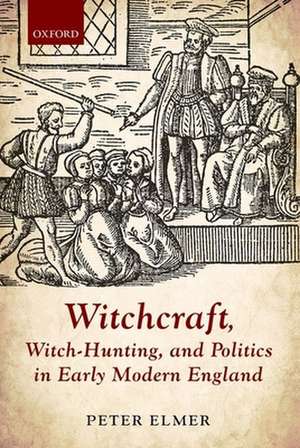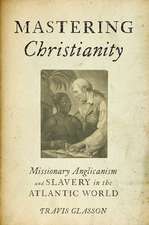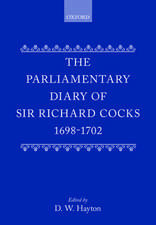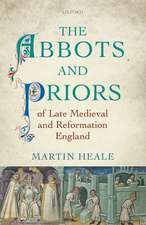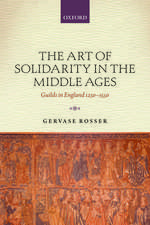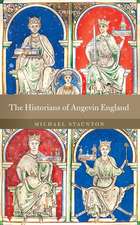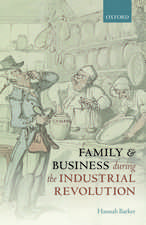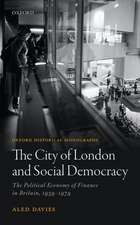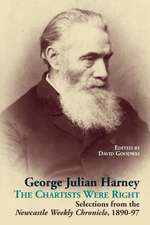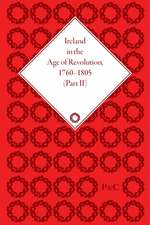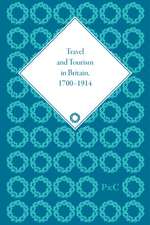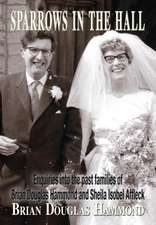Witchcraft, Witch-Hunting, and Politics in Early Modern England
Autor Peter Elmeren Limba Engleză Hardback – 13 ian 2016
Preț: 703.92 lei
Preț vechi: 966.47 lei
-27% Nou
Puncte Express: 1056
Preț estimativ în valută:
134.70€ • 144.04$ • 112.31£
134.70€ • 144.04$ • 112.31£
Carte tipărită la comandă
Livrare economică 07-14 aprilie
Preluare comenzi: 021 569.72.76
Specificații
ISBN-13: 9780198717720
ISBN-10: 0198717725
Pagini: 384
Dimensiuni: 164 x 240 x 27 mm
Greutate: 0.7 kg
Editura: OUP OXFORD
Colecția OUP Oxford
Locul publicării:Oxford, United Kingdom
ISBN-10: 0198717725
Pagini: 384
Dimensiuni: 164 x 240 x 27 mm
Greutate: 0.7 kg
Editura: OUP OXFORD
Colecția OUP Oxford
Locul publicării:Oxford, United Kingdom
Recenzii
[M]asterfully researched....This book bursts with a wealth of case studies and microhistories that will no doubt assist witchcraft scholars, even if their research does not pivot around politics....Overall, this is a valuable and impressive contribution to current scholarship.
Reading Witchcraft, witch-hunting, and politics is a fascinating rollercoaster ride that throws you around and makes you see the history of witchcraft in new ways, if not quite upside-down. It is an experience that is highly recommended for everyone with even the remotest interest in early modern witchcraft.
Elmer provides flesh on the skeleton of significant research through insights as they apply not only to witchcraft in early modern England, but to the various contemporary 'other' manifesting throughout global phenomenology and material culture today.
Full of fascinating nuggets of information... this is an important, wide-ranging, and scholarly book that will need to be engaged with by all later writers.
Peter Elmer's book constitutes an indispensable work for anyone interested in witchcraft and demonology, but also more widely for all who are interested in the ways the political and the religious conjointly impact on any social behaviour and trend.
A truly brilliant book. It is immersed in staggering erudition and profound understanding, and crackles with intellectual self-confidence and penetrating insight. It is quite simply one of the most important books on English witchcraft ever written, and essential reading for anyone ready to learn what this strange and widely misunderstood subject once meant.
a fascinating and thought provoking book which provides a fresh and compelling take on witchcraft in early modern England ... Elmer is generous in flagging many potentially fruitful areas of future research along the way ... it is likely to prove an essential read for all scholars of early modern witchcraft, though it also offers much which will be of interest to historians interested in the politics and society of early modern England more generally.
This is a complex and densely argued academic work ... It should be of interest to all studying the religious and social history of the period.
Meticulously researched, this is a must read for students of witchcraft and early modern society in general ... Essential.
Reading Witchcraft, witch-hunting, and politics is a fascinating rollercoaster ride that throws you around and makes you see the history of witchcraft in new ways, if not quite upside-down. It is an experience that is highly recommended for everyone with even the remotest interest in early modern witchcraft.
Elmer provides flesh on the skeleton of significant research through insights as they apply not only to witchcraft in early modern England, but to the various contemporary 'other' manifesting throughout global phenomenology and material culture today.
Full of fascinating nuggets of information... this is an important, wide-ranging, and scholarly book that will need to be engaged with by all later writers.
Peter Elmer's book constitutes an indispensable work for anyone interested in witchcraft and demonology, but also more widely for all who are interested in the ways the political and the religious conjointly impact on any social behaviour and trend.
A truly brilliant book. It is immersed in staggering erudition and profound understanding, and crackles with intellectual self-confidence and penetrating insight. It is quite simply one of the most important books on English witchcraft ever written, and essential reading for anyone ready to learn what this strange and widely misunderstood subject once meant.
a fascinating and thought provoking book which provides a fresh and compelling take on witchcraft in early modern England ... Elmer is generous in flagging many potentially fruitful areas of future research along the way ... it is likely to prove an essential read for all scholars of early modern witchcraft, though it also offers much which will be of interest to historians interested in the politics and society of early modern England more generally.
This is a complex and densely argued academic work ... It should be of interest to all studying the religious and social history of the period.
Meticulously researched, this is a must read for students of witchcraft and early modern society in general ... Essential.
Notă biografică
Peter Elmer studied for his doctoral dissertation under Stuart Clark at Swansea University, working on the religious origins of medical reform in seventeenth-century England. He taught for seventeen years at the Open University, and in 2012 was appointed as Senior Research Fellow at Exeter University, where he currently works with a group of colleagues on a Wellcome Trust funded project designed to create a database of medical practitioners in early modern England, Wales, and Ireland.
